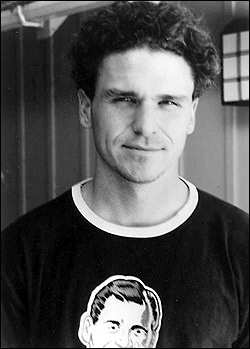Impressively bound, Dave Eggers’ latest story collection, How We Are Hungry (McSweeney’s, $22), looks like one of those black-covered, unlined journals used by coffee-shop poseurs until laptops, blogging, and instant messaging took over the auto-documentary urge. There’s no author photo, no dust jacket, no effusive blurbs. It’s got an elastic band to keep the thing closed and a ribbon stitched into the binding to keep your place. All very cool, as if to say: No salesmanship here—we’re above that at McSweeney’s (the lit mag and publishing house Eggers has built into an iPod era brand of hip).
Though a few of the 15 stories collected here have appeared, in different form, in The New Yorker and other publications, Eggers is doing everything possible to avoid looking old-school, despite the packaging of his book. It’s a joke, ha-ha, like one story, “There Are Some Things He Should Keep for Himself,” that consists of four blank pages. Ha-ha. That is so totally not like The New Yorker, dude. Half these entries are likewise interstitial filler, short little throwaways that might be found, yes, in some writer’s notebook.
So where does the irony stop and the literature start? Often at the U.S. border, since several of Eggers’ protagonists find themselves—spiritually, I mean—in foreign climes. In “The Only Meaning of the Oil-Wet Water,” a woman surfing in Costa Rica considers a kind of pantheistic bliss among the perfect waves, then rejects the notion: “God gave way to a system of extremes, and implied choices, and choices required separations, divisions, subtle condemnations.” She wants connection and fluidity, not boundaries and barriers. In “Quiet,” a tourist visiting England’s Isle of Skye has an epiphany of sorts while watching rowdy seals from his rowboat: “Was not everything, on a cellular level, well-maintained, logical and unimprovable, like a honey comb?” Then he looks down and realizes his boat is sinking; nature’s logic has no more regard for him than it does the surfer. They’re just flotsam, and they feel small. The same feeling of powerlessness and insignificance grips a woman climbing Tanzania’s Kilimanjaro in “Up the Mountain Coming Down Slowly.”
But not every story requires a visa. The comic “Your Mother and I” reads like a rant about everything that’s wrong with Dubya’s America, taken from the possibly senile perspective of a guy who—with his wife—solved all of America’s problems during the ’70s and ’80s. He recalls, “We put llamas everywhere. We made it so smoke detectors could be turned off without having to rip them from the ceiling.” And they make it “illegal to have more than one president from the same immediate family. We’d had the Adamses and Bushes and we were about to have the Clintons and your mother just got pissed.” Sounds like progress to me.
Elsewhere, there’s even a first-person tale from a doomed dog. Eggers ranges far and wide in this collection. The long-short-long pattern to Hungry gives his writing an off-the-leash effect; he doesn’t have to stay anywhere for more than a few pages before he goes nosing off into another subject. His prose is simple and streamlined; there are no recondite words or baroque metaphors to slow his romping. He writes to be read at the maximum download rate. Here, watermelon slices on a platter become “small green boats with red sails on a silver round lake.” There, a woman muses: “Nicaragua! It sounded like some kind of spider. There it goes, under the table—Nicaragua!” A suicidal old man’s bones “feel hollow, seashells stitched together with wire.” He artfully arranges ordinary speech.
Eggers’ unadorned style gives the volume its cohesiveness, though there’s seldom the sense of being engaged with a larger project. Little authorial asides often tease the reader’s expectations of the short-story form. Early in the surfer’s rendezvous with a possibly future lover, he interjects, “This story is not about Pilar and Hand falling in love.” Before it becomes a story, “Notes for a Story of a Man Who Will Not Die Alone” begins as an outline for an 8,000-word story; Eggers plays with the apparatus of short-story writing, though it’s not exactly a mocking of the form. Irony and sincerity are often at odds in contemporary fiction, but Eggers’ self-consciousness isn’t distancing in that way.
Rather, there’s perhaps the faintest sense of boredom with the short-story form, which is so unlike his whopping-big breakthrough memoir, A Heartbreaking Tale of Staggering Genius. Between the magazine editing and the compiling of various McSweeney’s-branded anthologies (which have become a kind of mini-industry), who has time to tackle the Great American Novel? Or, more crucially, what writer still subscribes to the outdated notion of one career-defining magnum opus? Hungry‘s brief excursions and digressions might be judged as avoidance or procrastination in a more traditional literary context; today, however, such sidestepping almost looks like progress.








